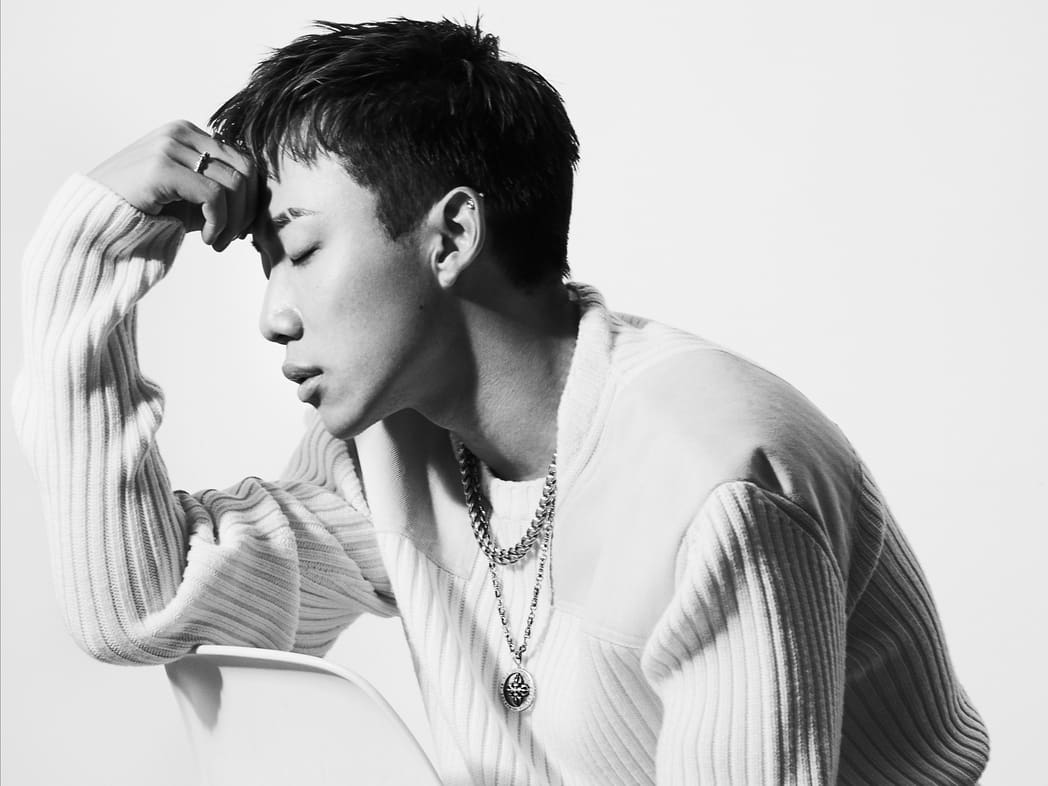
Interview ØZI: If even music awards do not support all kinds of music, then bye Chinese pop music
Releasing his first album last year at the age of 21, ØZI is still referred to as “Irene Yeh’s son” by the media. This year he did everything from composing, singing, to directing and the production of the album “ØZI: The Album” and bagged the title of “Best Rookie”. In his first interview after the thrill of receiving the award, we met with this redhead young man – who demonstrated such maturity in talking about music, yet revealed a bit of childishness when talking about life – and chatted about how he concluded his first music award by “a historic year”.
After the award, many experts concluded that it seems like the idolised celebrities churned out by conventional record labels and the humdrum Chinese pop songs will eventually be knocked out by the industry that is fresher and produces more diversified music. ØZI has barely set foot in this circle, yet he already raised this question about “newcomers” in previous interviews at least a year back. The seniors of this music circle could not solve this problem, yet this year’s music award seemed to have given ØZI a satisfactory answer.
No matter how talented the musician is, if he does not have any awards or influence, he would not be valued. That’s how it is with the media, audience and community. Just like how Shawn Sung got unprecedented attention because of the music award. As for OZI, the newcomer award is a starting point – he could be a musician, a producer, a director, but he is also if not more of a fighter; he does not just sit and complain about the Chinese pop music status quo, he gets up and fight.
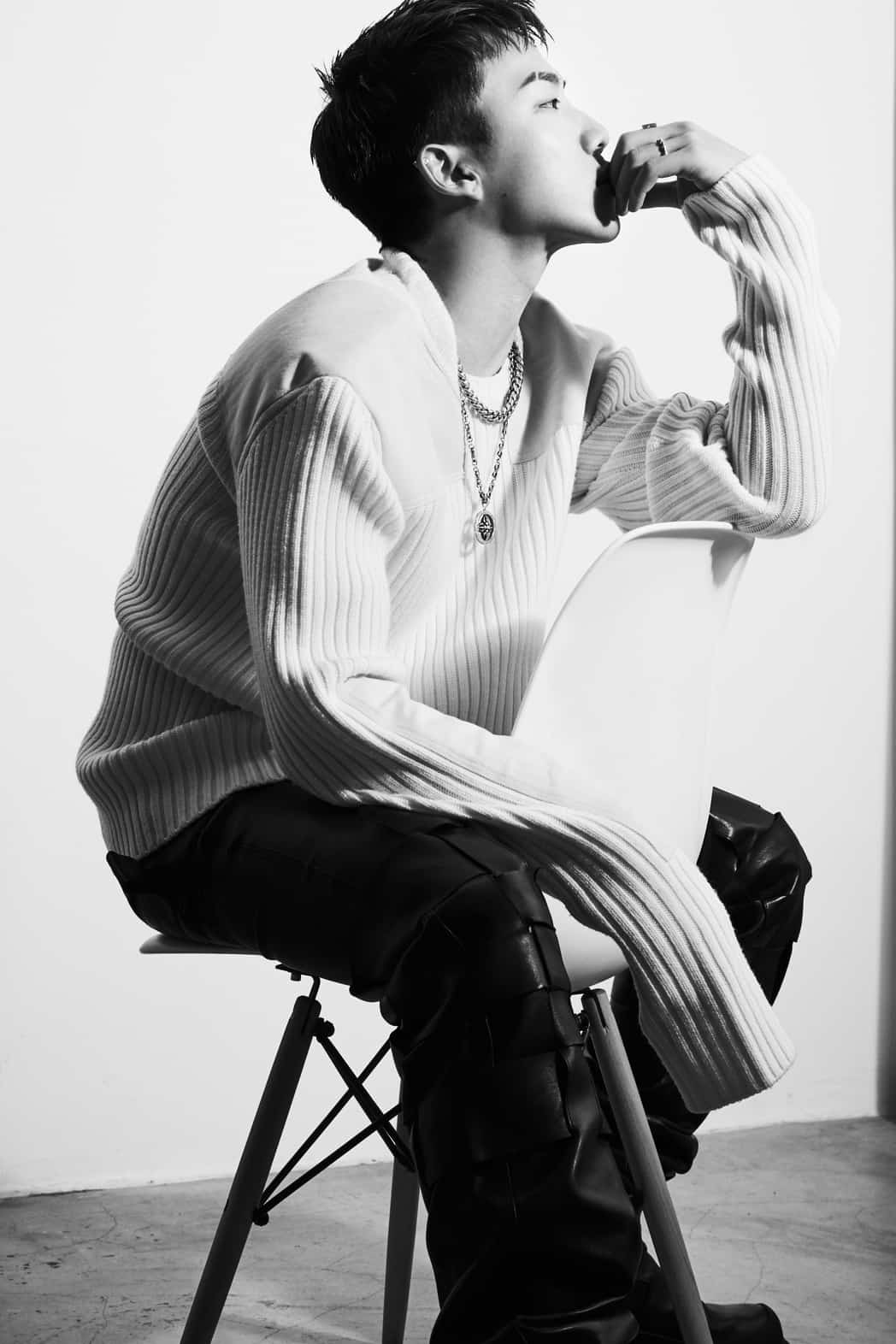
White contrast sweater TW$ 167,400; Black sheepskin woven leather pants TW$ 23,000; Black leather boots TW$ 30,000 All by Bottega
Heaven Raven: Watching your mother perform in concerts and your father shooting artists, did you have any desire to be a part of the entertainment industry?
OZI: “No, I thought that was a very frustrating job. You have to maintain in a certain form at any time and show everyone or package yourself such that everyone sees the best sides of you. But I realise things are different now. I am certainly being myself and I make sure everybody knows that I am being myself.”
HR: You have learnt the piano, guitar, bass and other instruments since you were four. Have you ever got tired of music?
ØZI: “In fact it wasn’t just music since I was younger, my mother sent me to a lot of extra curricular activities: abacus arithmetic, swimming, hockey… I have done it all. I actually hated swimming the most. In the beginning I found music annoying, but once I stopped treating piano as just another lesson, I realised I quite enjoy classical music. There was a time in primary school when I liked the challenge of exams and played the most difficult pieces with very elegant techniques, like Jay Chou. Afterwards I started listening to pop songs, Linkin Park and really began to enjoy music.”
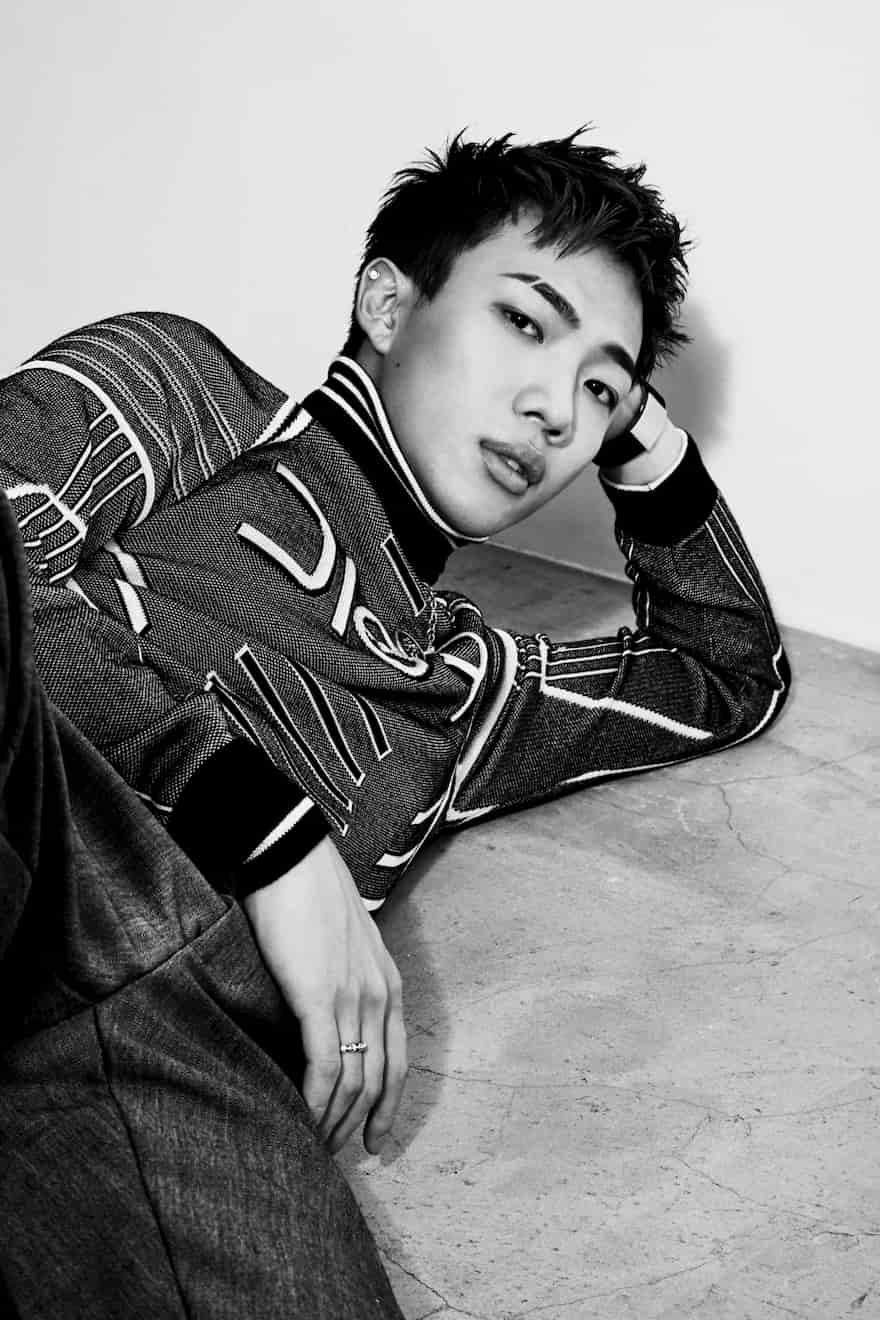
Sorayama Hajime logo wool roll-neck sweater TW$ 49,000; Gray wool & mohair blend canvas high-waist trousers TW$ 34,000 / All by Dior
HR: What was the most rebellious thing you have done?
ØZI: “I haven’t become really rebellious. The only conflicts between us is when I first began making music, my mother would say things such as ‘I don’t get this kind of music’, ‘Shouldn’t there be more high notes in the song?’, ‘Is it too monotonous?’ My father would give suggestions for the visuals like ‘The lighting was poor in this MV’ and ‘How is the camera movement?’.”
“Right now I’d probably say to my mother, the way I wrote my music is right. As for the visuals, I regret not listening to my father as eventually I realised he was right. My father is an artist, it is not the same as being a singer like my mother. It’s the difference between the artists’ school of thoughts and my mother’s; his way of thinking and logic are like an artist, which profoundly influenced the way I work now.”
HR: The media calls you “second generation star”, or they attribute your achievements to your parents. What do you think about that?

Wool sweater with embroidered patches TW$ 73,000; Green large classic striped shirt TW$ 22,500 both by Gucci; Black cotton short-sleeve top TW$ 9,800 by Bottega Veneta
ØZI: “In the beginning it wasn’t the media, but actually my parents who first said to me, ‘You know you will be called second generation star once you go into the entertainment industry.’ I did not think much of it at that time; the most important thing is to do great music, anything else is secondary. Now I see ‘second generation star’ as an identity, it means my parents are public figures such that I would be scrutinised by the media, but other than that it is nothing. It has nothing to do with how good my music is, or how good the visuals have been shot, so I don’t mind.”
“I am confident about my own work. Once you have seen my work and call me second generation star, that’s fine. But if you listen to my music because of this title, and find out it is really no good, then I would accept that is my problem. So I only care about how they look at my music, not the titles I am given.”
HR: When studying at Berkeley, you almost signed a contract with a Korean agency. Why did you decide to return to Taiwan?
ØZI: “The actual reason was, it had only been two weeks since I arrived at the school. Just as I was admitted and bought a bed, my Korean teacher said to me, ‘What are you doing here? You can go back – first go back to Asia to make music and be a star.’ He used to be a singing teacher in the Korean entertainment circle. He listened to the music that I wrote and directed in high school and felt that with my capabilities I should give it a go out there. He is also the person who told me I should go and be an idol and become a singer on the stage. After contemplating for a couple of months, I decided to come back to Taiwan.”
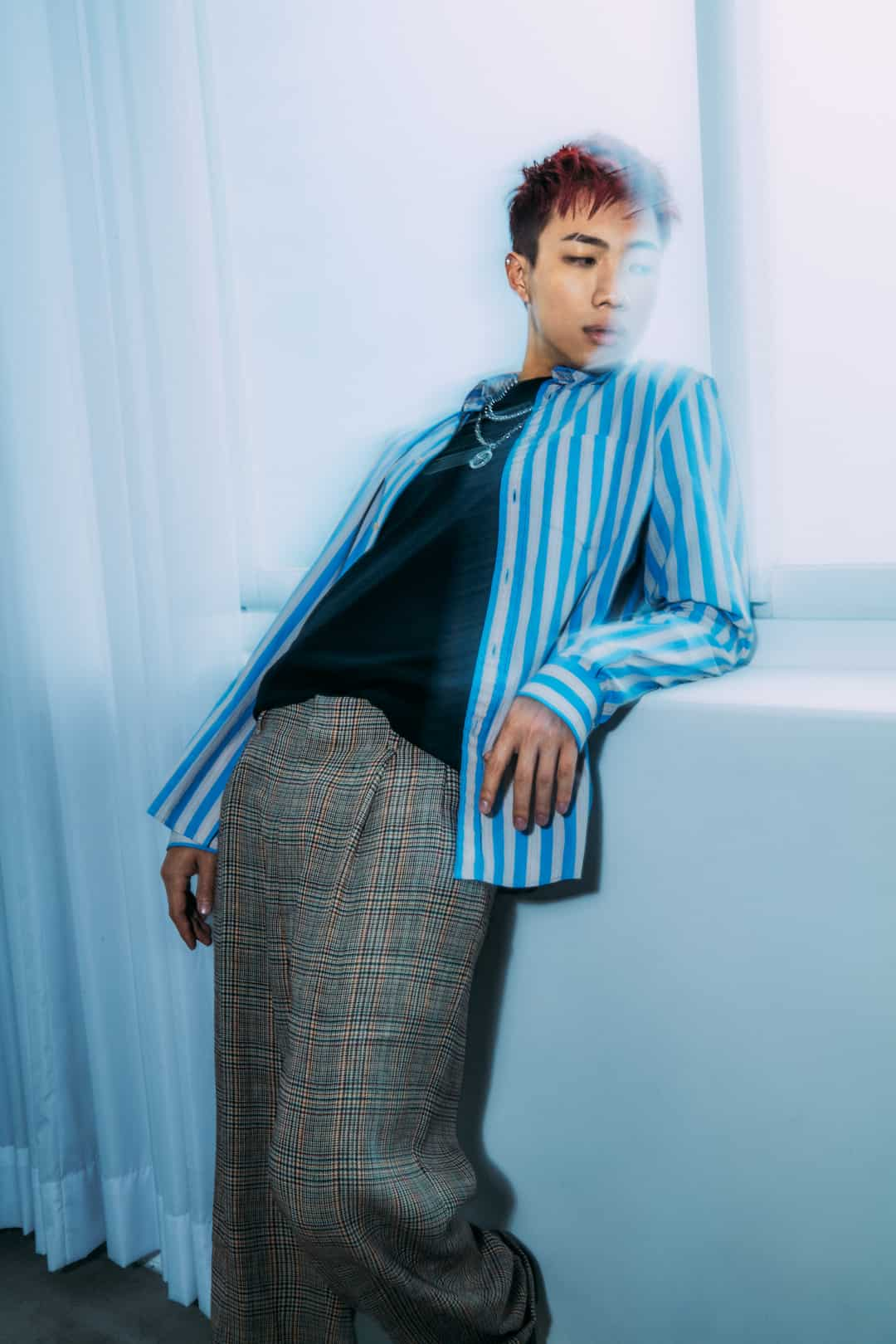
Green large classic striped shirt TW$ 22,500; Camel checked pants TW$ 46,100 both by Gucci; Black cotton short-sleeve top TW$ 9,800 by Bottega Veneta
HR: Did you have any difficulties getting used to Taiwan? After all the music and entertainment industry in Taiwan is not as big or mature as in the US or Korea.
ØZI: “Of course, that’s a fact. But I was nothing to begin with. I was not in the position to think that far ahead and judge how poor this place is or how the music is not as up to par. I just thought, right, at least I need some fans and a foundation before saying anything. So I first got to know some music friends when I returned to begin building my own brand. After I became professional, I then gradually had this thought:
“OK, it is time to face the issues of this environment. I have a sense of mission, I know how to change it, I should do it instead of leaving it or complaining why I am staying in this poor environment.”
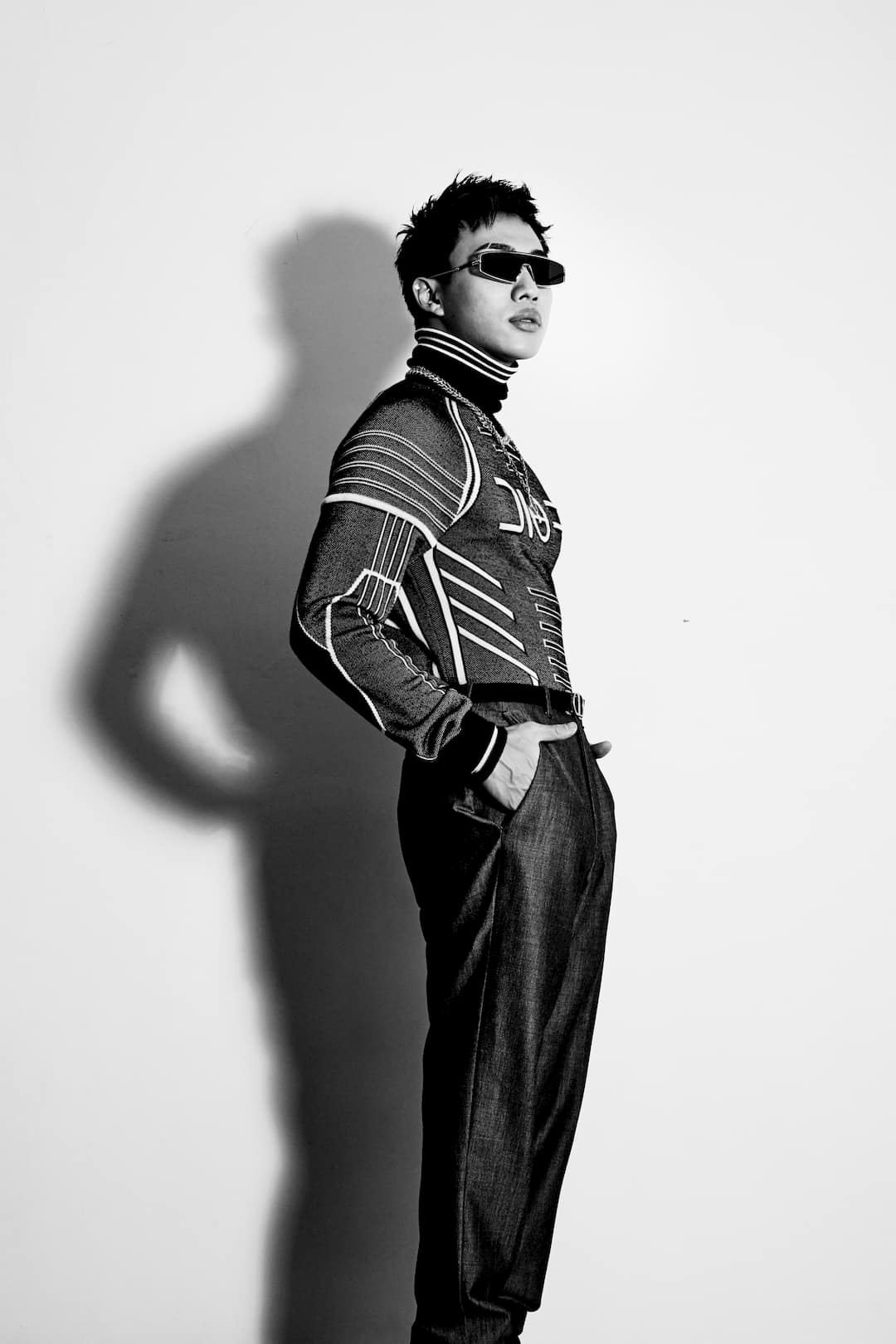
Sorayama Hajime logo wool roll-neck sweater TW$ 49,000; Gray wool and mohair blend canvas high-waist trousers TW$ 34,000; Sunglasses; belt with metallic logo buckle / All by Dior
HR: Specifically what are the issues with Chinese music?
ØZI: “Something that everyone has not had the courage to face in the past decade or so – is that the style of music has not progressed. There hasn’t been a superstar in more than 10 years. It is still people like Jay Chou and Jolin Tsai. This culture has not changed, Chinese pop songs have always been the same. If I ask you what is Chinese pop music, you would definitely think of those ballads that are frequently sung in karaoke. These lovey-dovey ballads are only becoming more varied in style in recent years.”
“Speaking more specifically, the reason for this is – if you like Chinese love songs, then I shall give you endless Chinese love songs since you like it. Most people won’t invest time in researching new music, they won’t say ‘Hip-hop is cool. Why is it cool? Let me learn about the hip-hop culture’, that’s impossible, they don’t have that time. They just play Spotify, the radio, so they will take whatever you give them, they will just eat one thing infinitely. This is a vicious cycle. The audience doesn’t want to progress, and the suppliers don’t plan on releasing something new.”

White contrast sweater TW$ 167,400 by Bottega Veneta
HR: Is the receptiveness of the audience crucial to this cycle?
ØZI: “Of course, but this is something that the musicians should change. When I first started discussing with many large companies, they were not willing to support what I want to do because of this phenomenon. For example I want to do hip-hop, but they think that not many people would listen to it, it won’t sell, and the refrain doesn’t sound like a ballad. The album should have at least one love song that would be the ending song of an idol drama, people would play it in karaoke and that’s the way to earn lots of money.”
“Then as a musician I thought, alright, since you have said it, I might as well do it. If I wasn’t lucky there would not be any response, but if I was lucky, there would be one thing extra I have to do. Since you like my love songs, I would keep making more for you. Eventually, it would become increasingly difficult to do hip-hop, R&B which are what I want to do.”
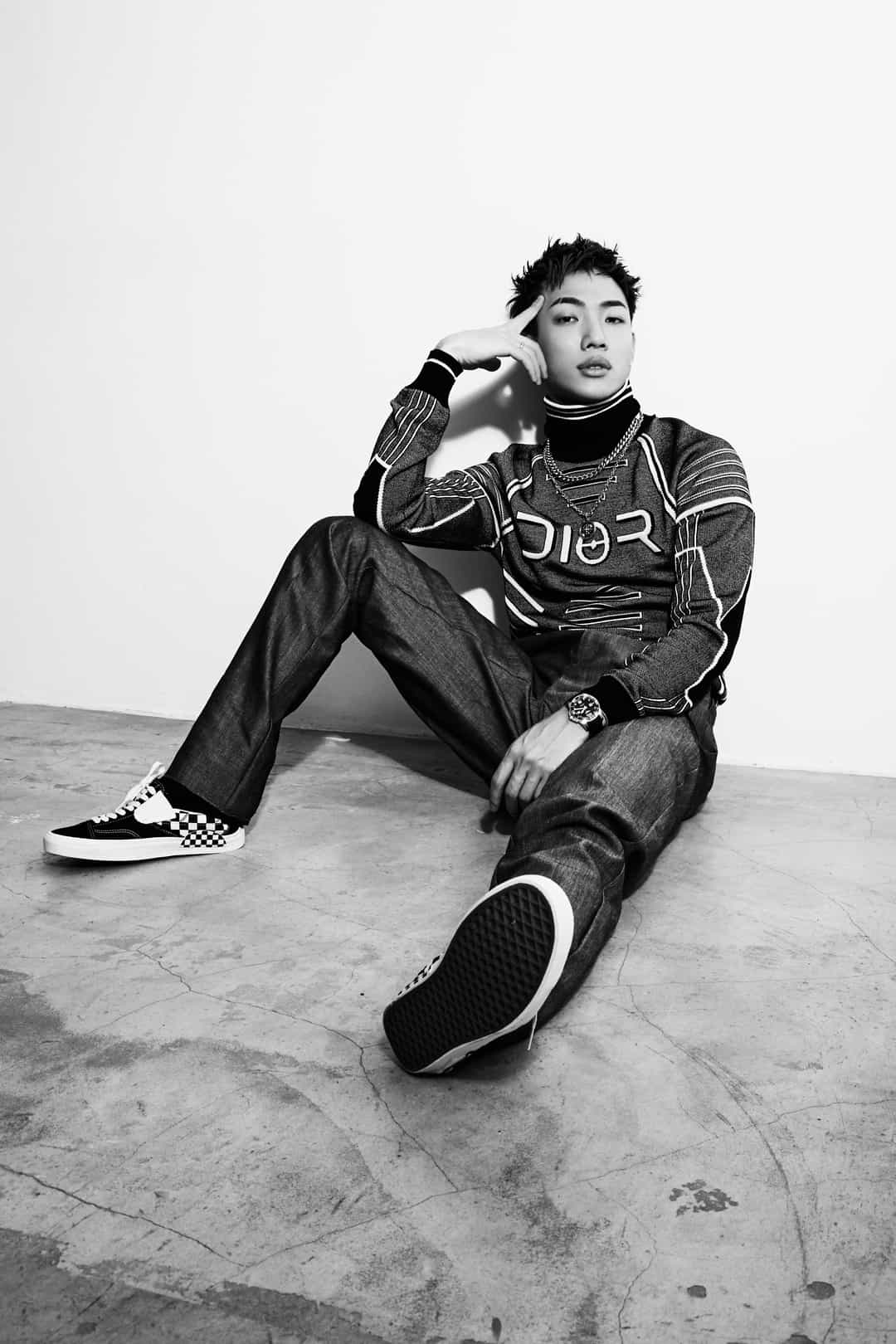
Sorayama Hajime logo wool roll-neck sweater TW$ 49,000; Gray wool and mohair blend canvas high-waist trousers TW$ 34,000 both by Dior; Shoes by Vans
HR: But you insist on making hip-hop and R&B from the beginning. Have you ever doubted or worried that no one would listen?
ØZI: “This is where I am lucky. I have always been doing hip-hop and R&B since high-school and never changed. The year I decided to enter the industry, The Rap of China came out and the whole environment changed. ‘Wow what is this? What’s hip-hop?’ A lot more people want to learn about it, and here I come right at that moment.”
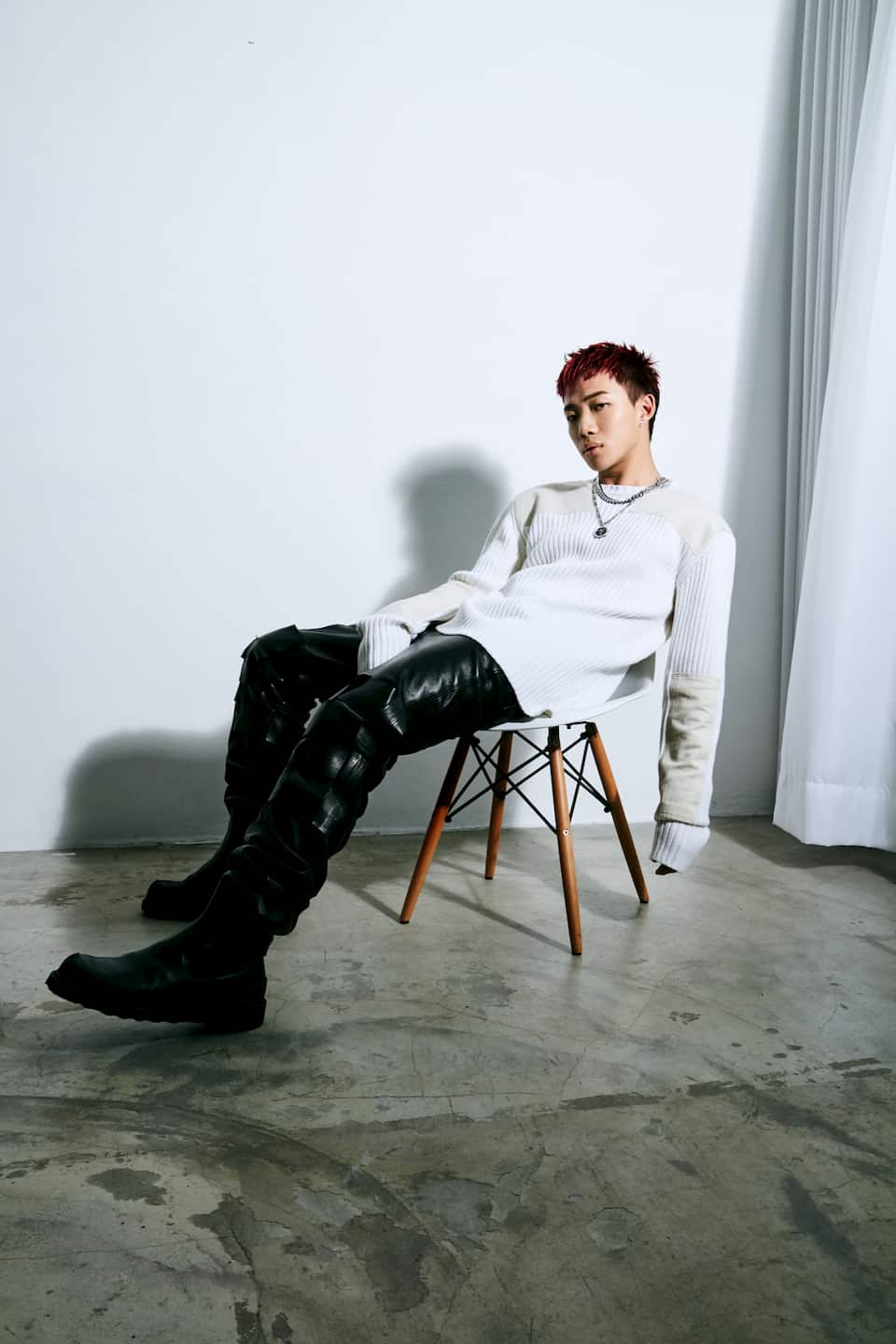
White contrast sweater TW$ 167,400; Black sheep skin woven leather trousers TW$ 23,000; Black leather boots TW$ 30,000 / All by Bottega Veneta
HR: In the book of Taiwan Hip Hop Kids, PoeTeK (known as 熊仔) wrote, “In the past, Dog G (大支), Mc Hotdog and Softlipa (蛋堡), they are Son Goku (the main protagonist in the Japanese anime Dragon Ball). After training for a long time, they finally became a Super Saiyan. Whereas we, the new generation, are Gohan (the elder son of Goku). We have our way paved for us, while those like OZI are Goten (the younger son of Goku), they are born as Super Saiyan.” What do you think?
ØZI: “I think I must become a Super Saiyan right away. The barrier of entry of this circle has become higher; it is increasingly competitive. Dog G and Softlipa are the forerunners, they were the first to see this vision. More and more people like hip-hop and this culture because of them, it’s them who have set the rules of this game.”
“Therefore right now we are not entering a time when no one knows hip-hop or rap. A lot of people already rap and sing, many of them are very specialised, but with regard to production and direction, there aren’t many who such comprehensive abilities like me.”
“That’s why, since I have decided to enter the hip-hop circle, I must possess comprehensive abilities and score high on every aspect in order to become a Super Saiyan, to step into this circle and be stronger than everyone else.”
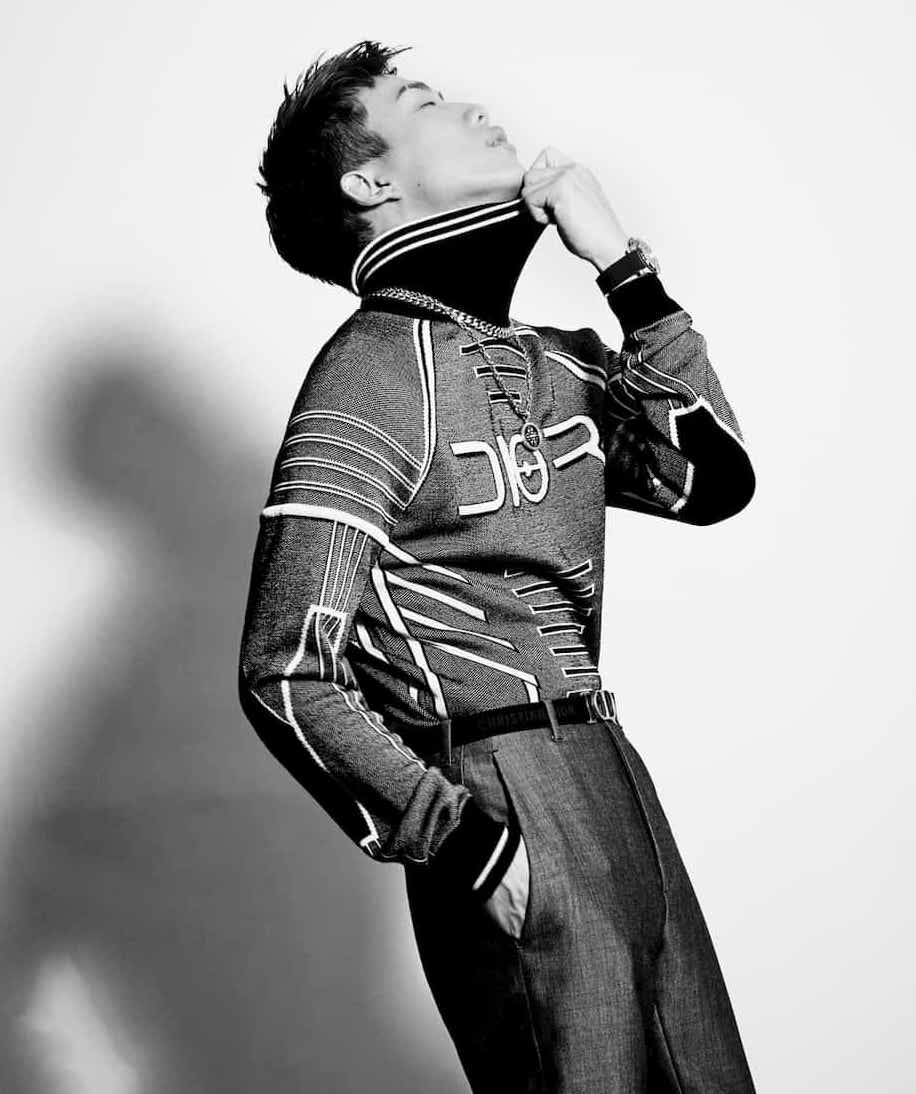
Sorayama Hajime logo wool roll-neck sweater TW$ 49,000; Gray wool and mohair blend canvas high-waist trousers TW$ 34,000 both by Dior; belt with metallic logo buckle / All by Dior
HR: In comparison with the seniors, what are the pros and cons for you as a new generation musician?
ØZI: “I was born in an era where you can instantly learn music arrangement on YouTube and listen to the world through the internet, so I never thought I am only competing with counterparts within the country. Today I have to look beyond and reach a position not just as so-and-so in Chinese music, but as an international musician.”
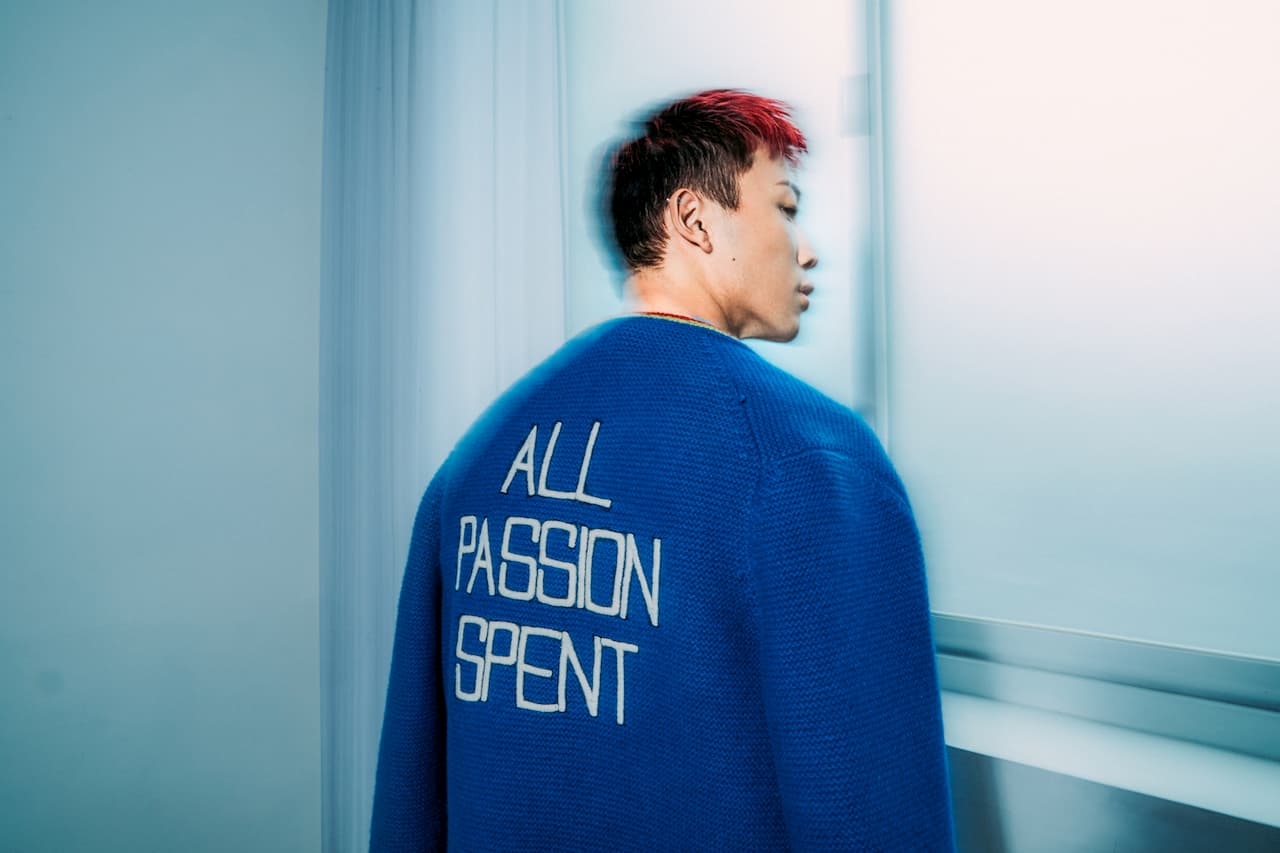
Wool sweater with embroidered patches TW$ 73,000; Green large classic striped shirt TW$ 22,500 / All by Gucci
“In the past, people would consider Chinese and international music separately. If you want to be popular here, then don’t think about doing this kind of music; if you want to be popular over there, then you must make ballads.”
“Right now what I am doing is bringing the two things together.”
HR: Then do you think receiving the music award would lend you more influence to achieve your goal?
ØZI: “I have both the power and voice. I communicate what I want to say. The music award lets everyone shift their focus here and lets them consider the things I say more seriously. It lets people know that my vision is globalising Chinese music. Globalising does not mean singing English songs, it is turning Chinese pop into something like K-pop.”
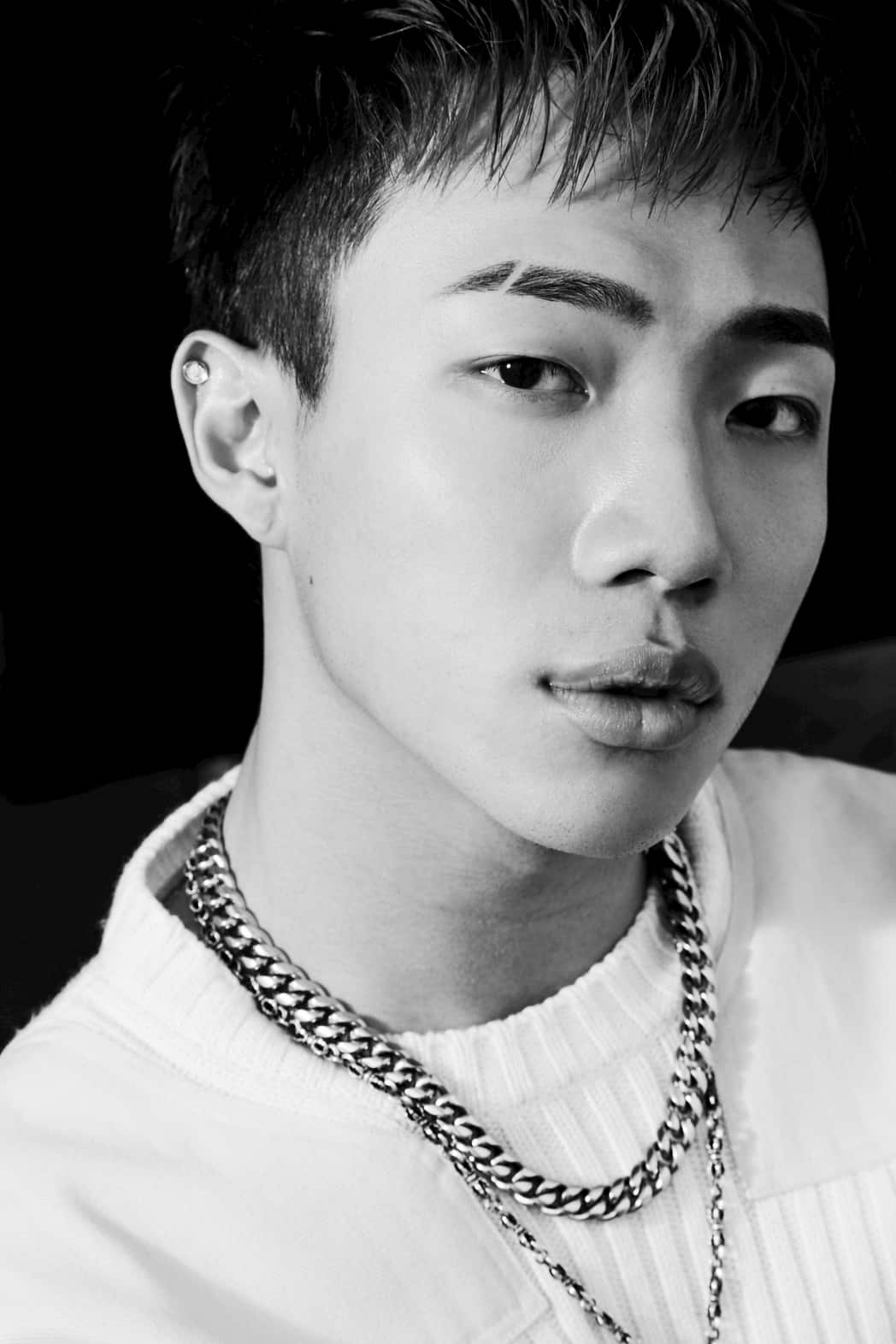
White contrast sweater TW$ 167,400 by Bottega Veneta
HR: Do you think “B.O.” has become what everyone calls a ballad?
ØZI: “‘B.O.’ is a song made with the least mental input. I finished it in 3 hours, I processed it the least. I thought it’s extraordinary how enthusiastic the response has been, as I never considered how catchy a song would be. Otherwise I would not have written songs like ‘Diamond’, definitely not. Basically not many people would sing my songs.”
“I really dislike talking about the catchiness of songs, because one has to feel the music. I would set the atmosphere – whether I want my music to be played in clubs or parties – then I would determine the style strategically. I don’t want to say this song has to get stuck in people’s heads, otherwise I should just write songs like ‘學貓叫’.”
HR: Some people find their creative inspirations from everyday living. Have you incorporated any private experiences into your work?
ØZI: “Not yet, but there are some recently. I don’t know if I could tell, but there will be soon. I think my last album is more like introducing myself, what music I make. At that time there weren’t many emotional states within me, I was only filled with ideas to change Chinese music. The private, personal experiences will be more obvious in my upcoming work hereafter.”

HR: Mickey Huang mentioned in his interview with The Reporter, the music award has become quite independent and hipster. But he tends to believe that the industry still needs to support pop stars to bring commercial competitiveness and influence. What do you think?
ØZI:
“I can understand his concept. But this is unfair to all the independent musicians. Why can’t they become an influencer in this era?”
“He probably means the artists groomed by big companies and with large amounts of money. But to me, everyone could become that influencer. I think ‘cultural influence’ in the music award is key; if you bury yourself in making independent music but have no fans or recognition by people or awards, then to a certain degree it is difficult for you to have any contribution to culture.”
“That said, I don’t think an award must be given to a mainstream singer. Just like this year’s award, there is such a variety of musical styles; everyone wants to get their own spotlight and push forward in rock, hip-hop, hipster and other kinds of music, hoping they could become better in each of their fields. Why should there be a ‘mainstream pop star’ to replace the influence of these people?”

Sorayama Hajime logo wool roll-neck sweater TW$ 49,000; Sunglasses / All by Dior
HR: But then do you think the resources for the music circle would be dispersed?
ØZI: “I think that is the situation right now. You see it’s the same in the US – if you like R&B then listen to Her, Daniel Caesar and Drake; if you like hip-hop then listen to Kendrick Lamar; if you want romantic music then listen to Adele, John Legend… these people are actually really popular in their respective fields. There can be superstars in every genre, so I don’t think the resources are dispersed, but people need to go support singers of every genre and be able to appreciate different kinds of genres, not only focusing their attention on a singular kind of music.”

Wool sweater with embroidered patches TW$ 73,000; Green large classic striped shirt TW$ 22,500; brown and cream coloured leather sole Moccasin shoes TW$ 29,600 All by Gucci; Black cotton short-sleeve top TW$ 9,800 by Bottega Veneta
HR: Are the resources in Taiwan’s music industry unevenly distributed?
ØZI: “If you asked me half a year ago, I would definitely say yes. But after the music awards, I found out everyone finally realised this problem. If even the music awards won’t support a variety of music, then those non-mainstream will never have the chance to expand their fan base and the Chinese pop industry will become extremely dull.”
“On Youtube, you can watch songs made by Korean and American. Through Spotify, you can listen to the whole world. Then why do we need to listen to Chinese pop?”
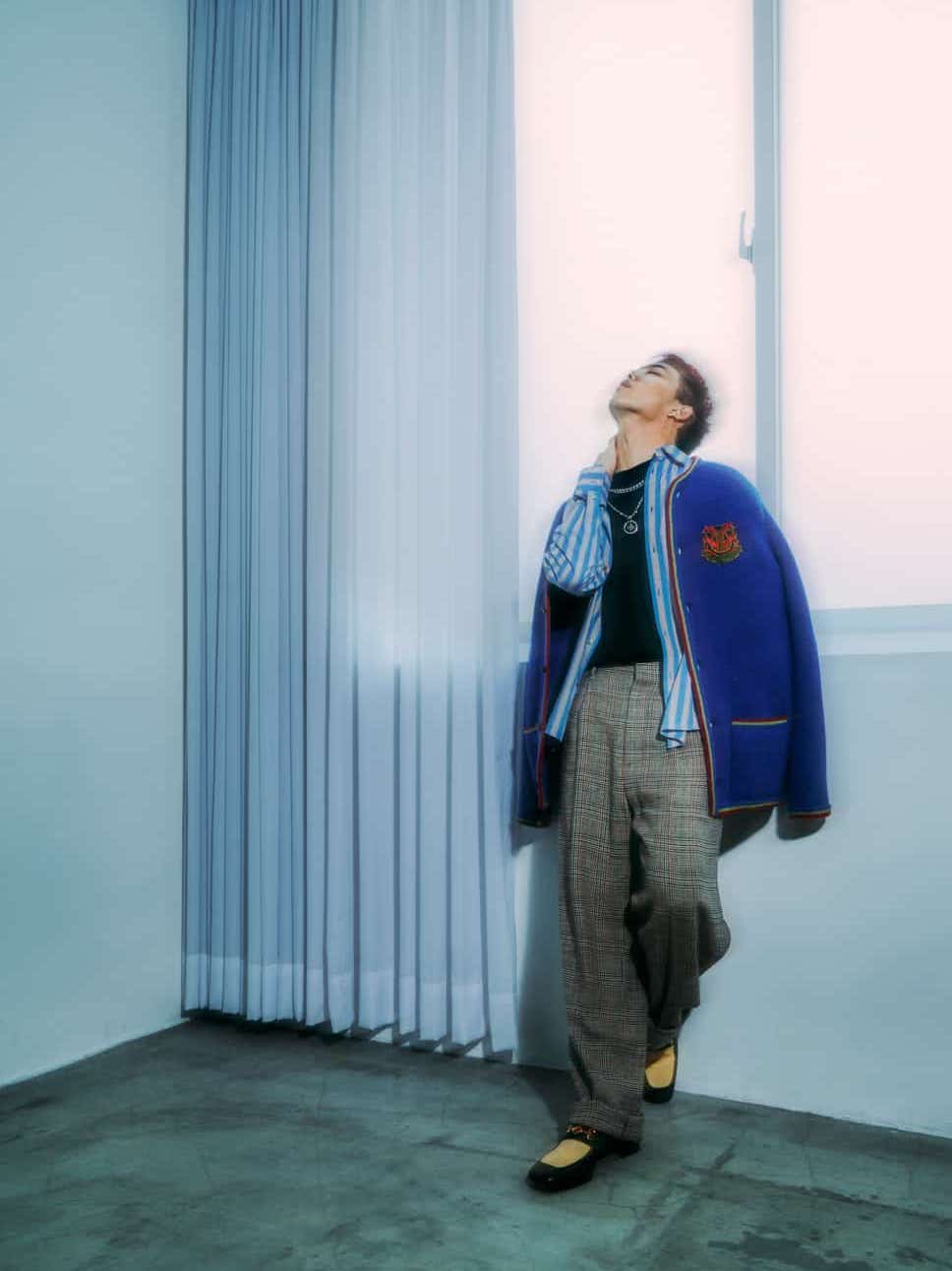
Wool sweater with embroidered patches TW$ 73,000; Green large classic striped shirt TW$ 22,500; Brown and cream coloured leather sole Moccasin shoes TW$ 29,600 All by Gucci; Black cotton short-sleeve top TW$ 9,800 by Bottega Veneta
HR: You have once said you want to push Chinese songs to the international scene. But there’s often a dilemma in Taiwan: If a song lacks Taiwanese elements, how does it legitimately represent the culture to the globe?
ØZI:“ I know where this idea comes from. But I take it differently. For instance, K-pop is now truly globalised. Yet, you don’t hear much Korean elements in their songs. But the songs have become a gateway for people outside to get interested in Korean cultures.”
“Also, if you keep telling an American how cool night markets are, would they care? Music is a way to intrigue them and make them feel hip hop tracks made in Asia can be as cool. Once they are interested in the songs and wonder who made them, they will be intrigued by their cultures and the countries the musicians come from.”
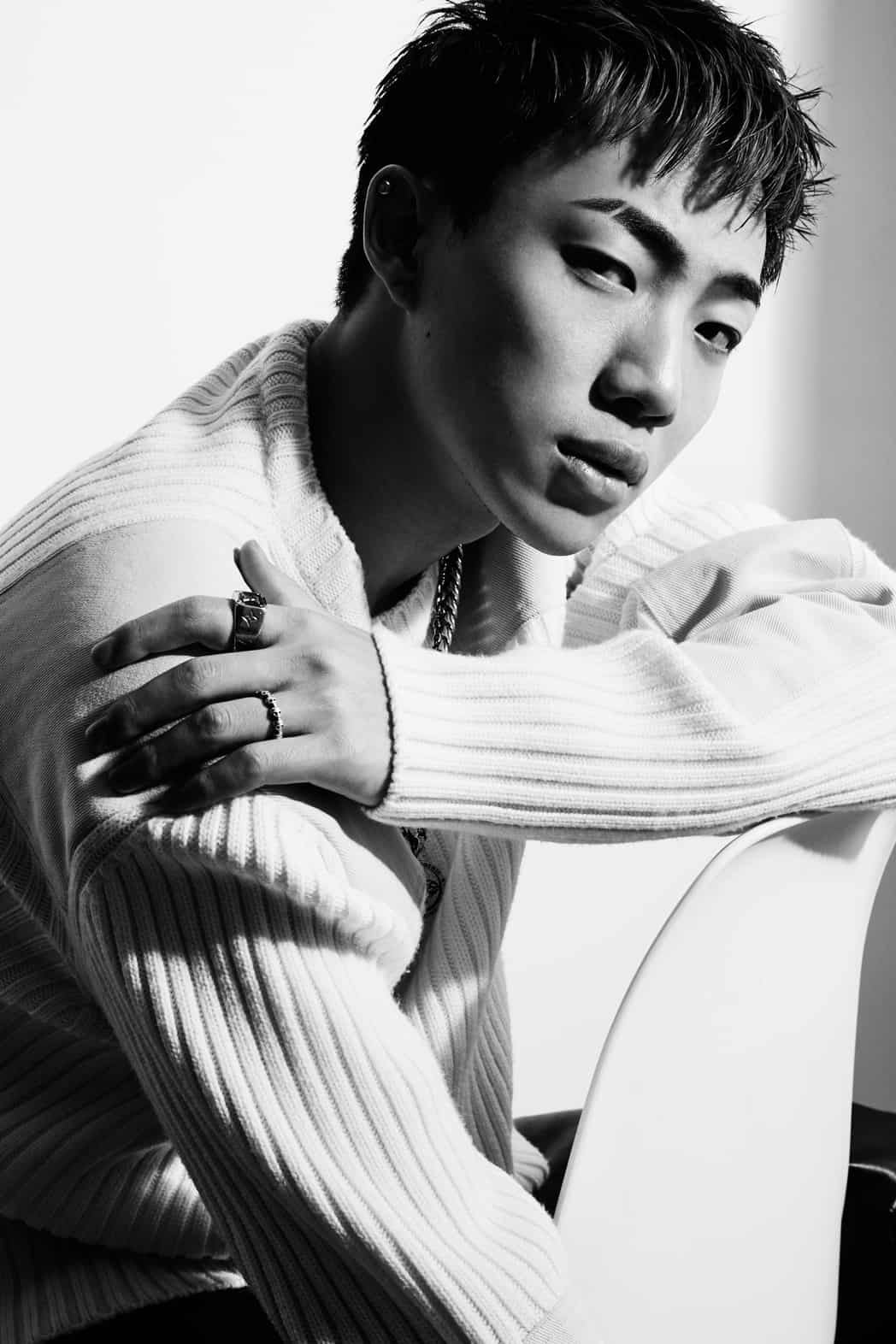
White contrast sweater TW$ 167,400 by Bottega Veneta
HR: What has the award changed you?
ØZI: “Not really. I don’t make music for awards. Many start making their music by thinking how they will get awards and what the judges like. But surely the awards are the cherry on the top. The Best Rookie is a once-in-a-lifetime opportunity though. I appreciate that. But the other trophies, they are recurring annually and I will have the opportunity every time to take them.”
https://www.instagram.com/p/BzUWX-ehTcX/
HR: Who are your fashion icons?
ØZI: “I follow Pharrell Williams, A$AP Rocky, Jaden Smith and sometimes Justin Bieber. Kanye West in the past. They are the people with strong individuality. ”
HR: Finally, what do you want to say to those who have just started their music career and those who want to make a dash in the Taiwanese music circle?
ØZI:“ Stop thinking mainstream or not, ballad or not. Put those labelling aside. Just focus on how to make your work better. Present your qualities. No compromise on any details. You still have to sing and perform well even you have got kickass tunes and lyrics. Or make a music video with no sensibility? No details can be given up.”
https://www.instagram.com/p/BzVPwxrBw1s/
HR: Does that “sensibility” relate to money?
ØZI: “Not at all. Half of my music videos were shot on iPhone. Money isn’t an excuse. That’s the least excuse I would accept. If you have a good concept, use iPhone for one take. I think that’s dope.”

